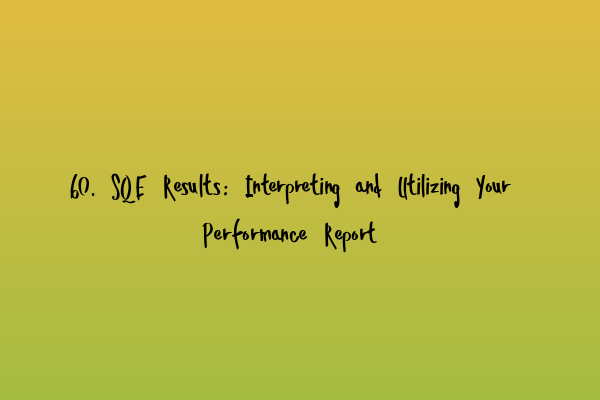60. SQE Results: Interpreting and Utilizing Your Performance Report
Congratulations on completing the SQE exam! As a solicitor, receiving your performance report is a crucial step in understanding your strengths and weaknesses, and creating an effective study plan moving forward. In this blog post, we will dive into the intricacies of interpreting and utilizing your performance report to maximize your success in the SQE exams.
Before we delve into the details, it’s important to note that the SQE performance report provides you with a breakdown of your performance in each competency area. This breakdown will be instrumental in identifying areas where you excelled and areas that require improvement.
Understanding the Performance Report
The SQE performance report is divided into several sections, each providing valuable insights into your performance. Let’s explore these sections in detail:
1. Overall Performance
The first section of your performance report gives an overview of your overall performance in the exam. It will provide you with a score that reflects your performance relative to the passing threshold. This score is an essential benchmark to assess your readiness for the solicitor qualification.
To understand your overall performance, it’s crucial to review your score in conjunction with the competency areas’ breakdown, which we will discuss next.
2. Competency Areas Breakdown
The competency areas breakdown is the heart of your performance report. It provides a detailed analysis of your performance in each competency area, allowing you to identify strengths and weaknesses.
Each competency area is assigned a percentile rank, giving you an indication of how you performed compared to other candidates. By reviewing this breakdown, you can focus your study efforts on weaker competency areas while leveraging your strengths.
Take the time to carefully analyze each competency area, paying attention to any significant deviations from the passing threshold. This will help you prioritize your study plan and allocate more time to areas that need improvement.
For a comprehensive understanding of how to apply your knowledge in real-life scenarios, consider reading our article on SQE Case Studies: Applying Knowledge in Real-Life Scenarios.
3. Sub-Competency Areas Breakdown
In addition to the overall competency areas breakdown, your performance report may provide a further breakdown into sub-competency areas. This breakdown offers granular insights into your performance within each competency area.
By reviewing the sub-competency areas breakdown, you can identify specific areas within a competency where you excelled or struggled. This information will be invaluable when designing your study plan and focusing on specific topics that require attention.
Time management is crucial in the SQE exams. To learn effective strategies for efficient exam completion, check out our article on Mastering Time Management in SQE: Strategies for Efficient Exam Completion.
Utilizing Your Performance Report
Now that you understand how to interpret your performance report, it’s time to harness this valuable information effectively. Here are some key tips for utilizing your performance report:
1. Identify Areas of Improvement
Review your performance report carefully and identify areas where you fell below the passing threshold or scored lower percentile ranks. These are the areas that require additional attention and focused study.
By acknowledging and addressing your weaknesses, you can strengthen your overall knowledge and improve your chances of success in future SQE exams.
To gain further insights into analyzing your mock results and identifying areas of improvement, take a look at our article on Analyzing Mock Results for SQE: Identifying Areas of Improvement.
2. Strengthen Your Weaknesses
Once you’ve identified the areas that require improvement, create a study plan that focuses on strengthening your weaknesses.
Explore different study materials and resources that cater to these specific areas. Practice questions, mock exams, and targeted revision techniques will all contribute to enhancing your knowledge and performance in these competency areas.
If you struggled with multiple-choice questions in SQE1, we recommend reading our article on Conquer the Multiple Choice Questions (MCQ) in SQE1 for valuable tips and strategies.
3. Leverage Your Strengths
Your performance report also highlights your areas of strength. While it’s crucial to focus on improving weak areas, don’t neglect your strengths.
Continue reinforcing your solid understanding of these competency areas, but also allocate time to maintaining and expanding your knowledge in areas where you excel. This will ensure a well-rounded skillset as you progress in your legal career.
For expert advice on mastering effective revision techniques for SQE success, our article on Mastering Effective Revision Techniques for SQE Success is a must-read.
4. Regularly Monitor Your Progress
Your performance report is not only useful for initial interpretation but can also serve as a yardstick to measure your progress over time. Regularly review your performance reports from mock exams and subsequent SQE attempts to monitor your improvement.
This ongoing assessment will allow you to track your growth and make necessary adjustments to your study plan, ensuring you stay on the right track to success.
Conclusion
Interpreting and utilizing your performance report is a critical step in your SQE exam journey. By understanding how to analyze your overall performance, competency areas breakdown, and sub-competency areas breakdown, you will be equipped with valuable insights to enhance your study plan and focus your efforts appropriately.
Remember to embrace your strengths while diligently working on your weaknesses. Strive for continuous improvement and regularly monitor your progress by reviewing subsequent performance reports.
Good luck with your future SQE exams, and may your performance reports guide you towards solicitor qualification success!
